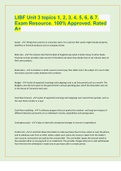Exam (elaborations)
LIBF Unit 3 topics 1, 2, 3, 4, 5, 6, & 7. Exam Resource. 100% Approved. Rated A+
LIBF Unit 3 topics 1, 2, 3, 4, 5, 6, & 7. Exam Resource. 100% Approved. Rated A+ Assets - -Things that a person or a business owns. For a person their assets might include property, jewellery or financial products such as company shares. Bank rate - -The interest rate that the Bank of Engla...
[Show more]



